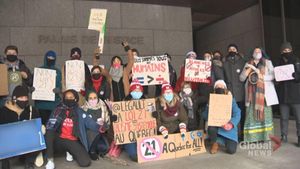Axel Rudakubana, the teenager who inflicted unfathomable horror on families and the Southport community, has been sentenced to life imprisonment with a minimum term of 52 years for the brutal murders of three young girls at what was supposed to be a joyful Taylor Swift-themed dance class. The attack on July 29, 2023, which shocked the nation, resulted not only in the deaths of nine-year-old Alice da Silva Aguiar, six-year-old Bebe King, and seven-year-old Elsie Dot Stancombe, but also left ten others wounded.
During the harrowing hearing at Liverpool Crown Court, Judge Julian Goose emphasized the gruesome nature of the crime, stating, "What he did... has caused such shock and revulsion to the nation..." He highlighted the savage reality of Rudakubana’s assault, characterized by multiple stab wounds inflicted on innocent children who were making friendship bracelets and singing. The murderous spree began shortly after he entered the venue, brandishing a kitchen knife purchased online. CCTV footage revealed the terrifying moment chaos erupted, as terrified young girls screamed and fled.
Disturbingly, Rudakubana expressed no remorse for his actions. After his arrest, he was overheard saying, "It's a good thing those children are dead, I'm so glad, I'm so happy." His chilling lack of compassion and distressing comments left families and witnesses reeling at the gravity of such cruelty.
The court learned Rudakubana, who was 17 at the time of the attack, had exhibited multiple troubling behaviors leading up to the incident. He had been referred three times to the UK’s anti-extremism program due to significant concerns about his obsession with violence. Despite this, authorities failed to recognize the red flags sufficiently to prevent the tragedy. Prime Minister Sir Keir Starmer described the event as "one of the most harrowing moments in our country's history," stating the need for serious reforms to avoid future tragedies.
The courageous dance instructor, Leanne Lucas, herself stabbed during the fray, expressed the heavy burden of survival, stating, "I cannot give myself compassion or accept praise, as how can I live knowing I survived when children died?" This sentiment lifted the dark veil of grief surrounding the case, emphasizing the long-lasting impact the violence will have on survivors and families.
The emotional testimonies from family members flooded the courtroom with heart-wrenching reflections. The parents of Alice shared the devastation of losing their daughter, stating, "We used to cook for three. Now we only cook for two. It doesn't seem right. Alice was our purpose for living, so what do we do now?" The pain felt by the families of the victims echoes throughout the community and serves as painful reminders of the violence they suffered.
Rudakubana's heinous acts have raised significant questions about safety, mental health, and the judicial system's interactions with individuals showing early signs of violent behavior. Following the sentencing, Southport MP Patrick Hurley has requested the Attorney General review what he termed as the "unduly lenient" sentence, pressing for stricter penalties for such grave offenses.
The families of the victims have welcomed the public inquiry now underway, aimed at identifying systemic failures and ensuring something as abhorrent as this doesn't recur. Darren Roberts, Chief Constable of Merseyside Police, remarked on the gravity of the attack, calling it ''ferocious'' and ''sadistic,'' illustrating the severe psychological repercussions it has sown across the community.
For the wider public, Rudakubana's actions ignited nationwide unrest amid misinformation claiming ties to terrorism. While the police confirmed there was no evidence to suggest his motives were politically or ideologically driven, the aftermath of the attack sparked anti-immigrant sentiments and public fear, leading to riots across the UK. The government's response included reiterations about the necessity of reassessing definitions surrounding acts of violence so they may align more effectively with contemporary threats.
Rudakubana's chilling episode will be remembered not just for the lives left shattered but also as a grievous lesson underscoring the imperative of vigilance against individuals rooted deeply in violent obsessions. With calls for change echoing from affected families to government officials, the enduring goal remains — to reinforce the structures meant to protect the most vulnerable within society.
All those affected by established terror are left grappling with their grief, haunted by the memories of what ought to have been days of joy. The haunting question now remains: how can society effectively safeguard against those who slip through the cracks of oversight, before tragedy strikes again?



